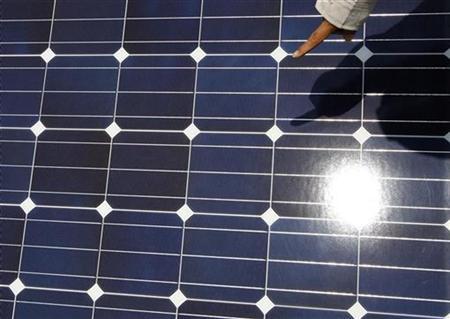 Japan approves renewable subsidies in shift from nuclear powerJun 18, 2012 - Yuko Inoue and Leonora Walet - reuters.com
Japan approved on Monday incentives for renewable energy that could unleash billions of dollars in clean-energy investment and help the world's third-biggest economy shift away from a reliance on nuclear power after the Fukushima disaster. Industry Minister Yukio Edano approved the introduction of feed-in tariffs (FIT), which means higher rates will be paid for renewable energy. The move could expand revenue from renewable generation and related equipment to more than $30 billion by 2016, brokerage CLSA estimates. The subsidies from July 1 are one of the few certainties in Japan's energy landscape, where the government has gone back to the drawing board to write a power policy after the Fukushima radiation crisis, the world's worst nuclear disaster since Chernobyl in 1986. The push for renewables is aimed at cutting reliance on not only nuclear, but pricey oil and liquefied natural gas for energy needs. The scheme requires Japanese utilities to buy electricity from renewable sources such as solar, wind and geothermal at pre-set premiums for up to 20 years. Costs will be passed on to consumers through higher bills. Utilities will pay 42 yen (53 U.S. cents) per kilowatt hour (kwh) for solar-generated electricity, double the tariff offered in Germany and more than three times that paid in China. Wind power will be subsidized at least 23.1 yen per kwh, compared with as low as 4.87 euro cents (6 U.S. cents) in Germany. Subsidies have spurred explosive growth in renewable energy in countries such as Germany, which has nearly tripled its output in less than a decade. LOW BASE Still, Japan's aim to accelerate investment in safer, cleaner and self-sufficient energy is starting from a low base: renewable sources apart from large hydro-electric dams account for only 1 percent of power supply in Japan. Nuclear power accounted for almost 30 percent of Japan's electricity supply before an earthquake and tsunami on March 11 last year triggered the Fukushima disaster. About 60 percent came from oil, coal and gas, but that share has risen to almost 90 percent as safety concerns led to all of Japan's 50 reactors being shut. The rest of Japan's electricity comes mostly from hydro. The government estimates capacity from renewable energy will increase to 22,000 megawatts by the end of March 2013, up from 19,500 MW now, with 2,000 MW of that from solar panels. But Japan has huge potential to generate renewable energy from the sun, wind and geothermal, analysts say. CLSA Asia-Pacific predicts solar capacity will jump to about 19 gigawatts by 2016 from about 5 GW or less now, while wind capacity may reach 7.6 GW in four years. The subsidies will benefit solar panel makers Panasonic Corp and Sharp Corp and solar project installer Sekisui Chemicals, along with wind farm developers such as Toyota Tsusho and Japan Wind Development. But foreign makers of solar panels - including Chinese equipment maker Suntech Power Holdings, Trina Solar and Canadian Solar - are also targeting Japan's market. "We believe the biggest change in market dynamics in the coming year will be a flood of cheap foreign panel manufacturers into Japan," said CLSA analyst Penn Bowers. POWER CUTS PUSH DRIVE FOR SELF-SUFFICIENCY Near Sendai on Japan's northeast cost, which was devastated by the earthquake and tsunami, memories of power cuts are fresh, prompting a drive for self-sufficiency. "People had to queue for hours several times a week to charge their cell phones during the blackouts, which lasted for up to three weeks," said Naoaki Ando, the manager of an office near Sendai of Sekisui House, Japan's biggest home builder. In a suburb of Sendai, Sekisui plans to complete a block of 431 houses fitted with solar panels within two and a half years. Odawara, a city of 200,000 south of Tokyo, is setting up its own power company that will install solar panels at public facilities and sell electricity to Tokyo Electric Power Co, the operator of the Fukushima Daiichi nuclear plant that was wrecked in the disaster. Residents who want to install panels on their homes will also get subsidies. "The high purchasing price under the feed-in-tariff system is great news for us," said Kazuhiko Katano, an official in Odawara's Energy Promotion Division. "The higher the price, the faster the penetration of panels will be." ($1 = 78.7300 yen) (Reporting by Yuko Inoue in Tokyo and Leonora Walet in Hong Kong; Additional reporting by Yoko Kubota and Risa Maeda in Tokyo; Editing by Aaron Sheldrick and Ed Davies) (This story was corrected to clarify utilities, not government, to buy at pre-set price in para 6) |
Email this page to a friend
If you speak another language fluently and you liked this page, make
a contribution by translating
it! For additional translations check out FreeTranslation.com
(Voor vertaling van Engels tot Nederlands)
(For oversettelse fra Engelsk til Norsk)
(Для дополнительных
переводов проверяют
FreeTranslation.com )


